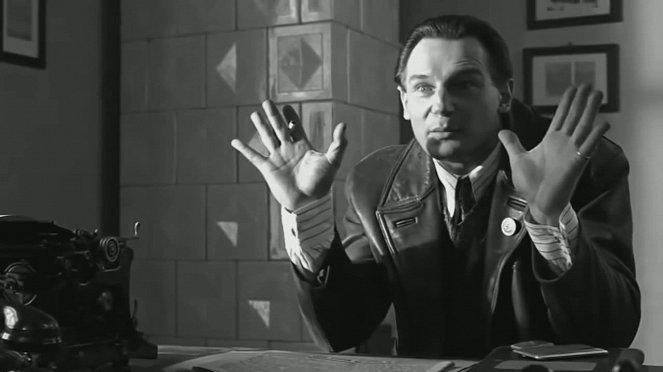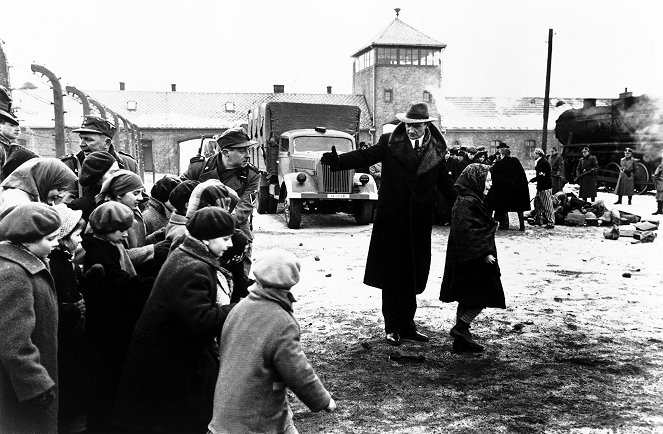Reżyseria:
Steven SpielbergScenariusz:
Steven ZaillianZdjęcia:
Janusz KamińskiMuzyka:
John WilliamsObsada:
Liam Neeson, Ben Kingsley, Ralph Fiennes, Caroline Goodall, Jonathan Sagall, Embeth Davidtz, Małgorzata Gebel, Mark Ivanir, Andrzej Seweryn (więcej)VOD (1)
Opisy(1)
Oskar Schindler, niemiecki przedsiębiorca, przyjeżdża do okupowanego Krakowa i zakłada fabrykę emaliowanych naczyń. Darmową siłę roboczą stanowią okoliczni Żydzi zmuszani do pracy przez hitlerowców. Majątek Schindlera się powiększa, mężczyzna zyskuje w oczach niemieckich oficerów. Sytuacja Żydów się pogarsza. W 1943 roku wchodzi w życie plan ich wymordowania. Krakowskie getto zostaje likwidowane, ludzie wywożeni są do obozu w Płaszowie. Schindler postanawia ich uratować od zagłady, wykupując nieefektywnych pracowników do fabryki. (TVP)
(więcej)Materiały wideo (8)
Recenzje (11)
Someone once described Schindler's List as the building block of Holocaust film history. Its influence confirms this, of course. Nicky's Family is not the only project that has taken inspiration from it almost literally, as Steven Spielberg simply chose to speak a universal language for academics and ordinary people alike.
()
Spielberg's sensitive precision, Williams's music, Kaminsky's cinematography, Neeson's eyes, Fiennes's villain, Kingsley's everything, the little girl in the red dress walking through the black and white film... An unforgettable story. PS: Finally seen in the cinema on the occasion of the 25th anniversary. Indescribable experience.
()
I consider Steven Spielberg to be one of the best storytellers in the world of film, regardless of how many stars I give to Schindler's List. He is an excellent craftsman and storyteller. Some voices in the community of film fans sometimes argue that he is too commercial and that they only take Schindler's List or Saving Private Ryan seriously from his work. I have the exact opposite feeling. Spielberg has always told fairy tales, whether for children or adults, and they are perfectly suited for relaxation and genre projects. Sci-fi, adventure stories, or fantasy from his workshop are usually treats. It's worse when he tries to enter the realm of high art and wants to do timeless, more serious work. Spielberg still uses similar or identical means as in his relaxation projects. In Schindler's List, several quite serious things bother me. First, the whole story is based on an artificially created myth, and even though its core is true, it ultimately sounds like Radio Yerevan reports. The facts are upside down here. Oskar Schindler was an adventurer, a Nazi not out of conviction but based on hard calculation, a manipulator, and a ruthless exploiter. Much negative can be said about him, and it would be much more accurate to despise and condemn him rather than admire him. Historical films usually approach the interpretation of historical facts languidly and only take from them what they need to achieve their goal or a partial effect. And usually, if it concerns distant history, viewers don't mind – except for historians and fans of historical science. But here it is so striking and concerns such a sensitive topic that it fundamentally bothers me. Schindler's real role has already been mapped by historians and completely contradicts everything Spielberg portrays in his film. In the labor camp, prisoners were mainly selected from the ranks of the Jewish police, collaborators, or those who had to pay. The conditions in the camp were very harsh, and its only advantage was that it was not systematically exterminationist, meaning that there were no gas chambers. Schindler was completely indifferent to the prisoners, and all he cared about was how to monetize their slave labor. By the way, neither Oskar Schindler nor anyone else saved any human lives. For those who were taken to the Protectorate, other prisoners had to be selected for liquidation… Another problem is Spielberg's typical squeezing of emotions, where possible, emotional manipulation, moving, blackmailing, and behaving like a typical blockbuster producer. Despite all this, he managed to convey the horrors of the Holocaust to the widest audience at a time when many decades had passed since the events and eyewitnesses were dying out, which is not insignificant. At the very least, the scene of the ghetto liquidation belongs among the memorable film moments. Overall impression: 60%.
()
When Spielberg puts forward his most fundamental mental dilemma alongside opinions and beliefs, nothing can arise but the strongest and extra tasty cinematic coffee and his intellectual peak. While Schindler's transformation from an ordinary citizen to an unstoppable advocate for all neighbors gains intensity perhaps a bit inconspicuously, during grand scenes and perfectly credible streams of thoughts from the mouths of the main characters, it becomes all the more emphatic. A truly unique and irreplicable work in its own way, in every aspect.
()
What can I write about this film if I don’t want to just dryly pull out all of the superlatives and assign them to every single component of its filmmaking? Welles had Citizen Kane, Coppola The Godfather, Kubrick A Space Odyssey and Spielberg has Schindler’s List. Portrayed by Ralph Fiennes, Amon Goeth is the personification of the collapse of the human spirit responsible for the greatest tragedy in our history. John Williams’s score is the pinnacle of contemporary film music, cinematographer Janusz Kaminski is an idol to me as a lover of black-and-white composition and the extermination of the Krakow ghetto is one of the most horrifying scenes that I have ever witnessed in a film. With Schindler’s List, Steven Spielberg fulfilled the purpose for which he became a director. And I would love to frame every shot from it and I wish that I could turn back time and prevent the events on which it is based.
()



Reklama